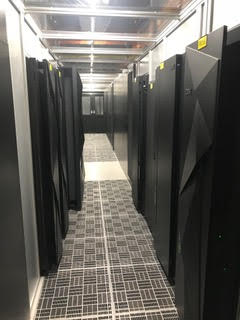Why have Telco colocation Data Centres managed to secure a place in some African markets and why will their dominance be short-lived?
The Telco colocation data centre has of necessity flourished in those markets where there is (a) little if any carrier neutral colocation capacity and (b) those where colocation revenues form a minor percentage of the total enterprise services market.
The overall digital ecosystem (submarine and terrestrial fibre-optic and data centre capacity) in a particular market also has a bearing on the presence, or otherwise, of carrier neutral colocation data centres. Telco data centres will predominate where there are few carriers and the prevailing metro fibre networks are immature. They are able to provide a full services stack from connectivity up to Cloud services.
In the long term this is not sustainable, from a customers’ perspective, as the lack of competition will keep prices high. Markets such as Cameroon and Cote D’Ivoire are examples where Telco colocation data centre capacity dominate. In more competitive markets like South Africa and Kenya there is more carrier neutral data centre colocation capacity than Telco data centre capacity.
Telco’s have seen the gap in some markets and filled it well. MTN has built data colocation data centres in Ghana and Cote D’Ivoire and are addressing a market need. Tigo and Orange have done the same in other markets. However the tide is turning.
What is driving the change? There is going to be a rapid expansion of the digital ecosystem across the major conurbations of the Continent as investors ramp up the rollout of connectivity infrastructure to meet the rapidly emerging demand for data services. This demand is being driven by a perfect storm of :
- lower data tariffs,
- cheaper handsets,
- data sovereignty regulations,
- data protection regulations,
- increasing acceptance of Cloud and managed services and
- customer demand for better quality (reduced latency.)
Carrier neutral colocation data centres are the missing piece in this puzzle and so they will proliferate. Carrier neutrality will become a bigger issue as the digital ecosystems expand. There will be an expansion of the range of both Cloud and managed services offered to SME’s and Enterprise customers and they will become more price sensitive.
This is where we expect to see carrier neutral data centres to start to pull away from their Telco counterparts. Data centre operators are focused on reducing costs and improving operational efficiency and will do so better than their Telco counterparts.
Telco’s have a broad range of technical skills in-house having to address a wide array of technical challenges only part of which includes data centre management. Carrier neutral colocation providers focus all of their technical skills on improving the design, build, management and operation of the data centre and thereby have built up a level of expertise which differentiates them from that within the Telco.
There is a view that Telcos will start to realise that data centres, like towers, are not assets that they necessarily need to own. Telcos are essentially marketing and billing machines and how their services get to their customers becomes less and less important.
It is possible that Telco’s will consider outsourcing their own data centre requirements initially through a sale and lease back model where they divest part or all of their data centres to independent (carrier neutral) data centre providers in exchange for a Service Level Agreement. It is anticipated that it will take (some) Telco’s as long to get their heads around this as it did for them to get their head around selling off their towers. But they will get there – eventually.
The cost of building and managing a data centre, especially in Africa, where suitable skills are in short supply will definitely, over time exceed the cost of leasing the same capacity from a suitably qualified data centre provider.
Whether you are a Telco, a bank or indeed a Government.
- More African tier-1 telcos* are rolling out multi-tenant data center (MTDC) colocation space, as they seek to ride the coattails of a data center segment that is increasingly becoming one of the hottest in the African ICT market.
- In June, Senegal’s Sonatel opened a new data center in the Dakar suburb of Rufisque; the Rufisque launch followed a similar rollout in Douala (Cameroon) earlier this year, and in the Ivory Coast last year. Other telcos have entered the fray; Tigo (a Millicom International brand) has launched data centers in Ghana, Chad and Senegal, and similar rollouts have taken place in a number of other African markets.
- According to estimates developed for our recent report on the African data center colocation market, tier-1 telcos account for nearly 60% of new MTDC space opened in Africa (outside of South Africa and Egypt) since 2015.
- This is an uncommon pattern for a competitive cloud/Infrastructure-as-a-Service market; in South Africa and Kenya for example, tier-1 telcos’ space accounts for less than 5% of new data centre colocation space installed between 2015 and 2017. It is a pattern, we believe, with substantial implications for how cloud services will develop in many African countries. It is also, we argue, a harbinger for a deepening Africa cloud divide.
Some markets certainly seem ripe for telco data centres. There’s existing –if small latent demand, while supply has traditionally been limited to unstructured and uncertified server rooms. There is also some underlying upside. In markets like Cameroon or the Ivory Coast, for example, revenue from colo services account for less than 1% of broader B2B and wholesale services revenues. In South Africa, Africa’s largest data center colocation market, that ratio is around 7%-10%. _
The telco therefore fills a glaring colo data center void. This is especially the case in markets with good underlying B2B potential, but limited competition in the fibre space and terrible metro and long distance fibre economics (see table in the next page). In such cases, the telco is not merely a colocation service provider; it offers the full connectivity and cloud stack, from colocation to virtualization and SaaS applications. _
There are mixed implications for these markets. On the upside, something is better than nothing. While the offerings are not neutral, telco data center facilities offer a credible starting point for migrating companies towards increased service externalization. In markets with built-in structural and regulatory deficiencies, they are essentially the only path forward.
The Ecosystem problem
There are challenges nonetheless. Data center and cloud markets are driven by a symbiotic ecosystem of connectivity, data center space and cloud service providers. Cloud and managed service providers in particular are critical drivers of colocation growth –and they seek digital ecosystems. Where telcos dominate the colocation space, the underlying cloud ecosystem is generally weak –telco dominance is as much a consequence as it is a cause of such weakness. These markets will grow, to be sure (there’s nowhere to go but up) –but such growth is likely to be highly concentrated in upper-tier enterprise segments.
And the Need for focus
Where credible carrier-neutral options exist, however, and the metro fibre segment is relatively competitive, telco data centers can be, to be plain, a waste of resources. For one, the telco data center is hampered by its own insular nature. The value of a multi-tenant data center, in large part, lies with its ecosystem. Because they are primarily built to offer telco services (and regarded with suspicion by other service providers), telco data centers typically have smaller connectivity and service provider ecosystems. Where credible carrier-neutral options exist, telco share of data center used space is materially smaller.
- Further, telcos don’t need to own data center assets to play in the hosting and managed services space. While the potential of the colocation opportunity is excellent, managed services and connectivity (two things telcos do well) are still the larger revenue (if not margin) opportunities; they offer 2x to 4x colocation space and power revenue.
- Given the complexity of offering services into the enterprise, a partnership approach is therefore inevitable –and in markets with excellent alternative data center options, there are few material advantages to owning physical data centers. Some telcos have understood as much. In Tunisia for example, some of the main Tier-1 operators are building partnerships with carrier-neutral MTDCs to leverage the latter’s facilities in building their cloud portfolios. Likewise, Vodacom Business is offering a strong suite of enterprise services in Nigeria while leveraging a partnership with carrier-neutral provider Rack Centre. We see such partnerships as the path forward.
- This is not a definitive argument against telco data centers. It’s ultimately an economics case,and depending on the cost of alternatives, it may make sense to build. But in this case, the data center is primarily a cost center –a piece of infrastructure that is leveraged to provide a suite of cloud services. And even then, the cost of building and managing could be higher than just leasing the space –especially considering potential revenue loss due to lack of ecosystem







